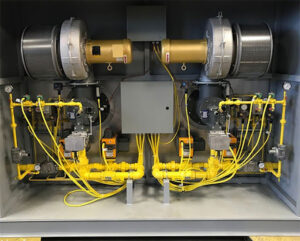Signs Your Legacy Burner Management System Needs Replacement

Is your outdated BMS putting your facility at risk?
In combustion operations, the Burner Management System (BMS) is the quiet guardian of both safety and productivity. But too many plants still run on control panels installed decades ago, which are systems that can’t keep pace with modern safety codes, data needs, or operational demands. A single outdated safeguard or unreliable interlock can trigger unplanned shutdowns, compliance headaches, or worse, a serious safety incident.
Recognizing the early warning signs of a failing BMS isn’t just good maintenance, it’s risk management. If any of the red flags below sound familiar, it might be time to plan a replacement before small issues become an expensive emergency.
Frequent Nuisance Lockouts or Manual Resets
If operators are constantly resetting the burner system after trips or faults, that’s more than just an inconvenience, it may be an indication of failing sensors, improper logic, or unresponsive control hardware. Modern BMS panels provide real-time diagnostics and fault pinpointing, something legacy systems usually do not offer.
Obsolete Flame Safeguard Controllers
Many older systems rely on controllers no longer supported by OEMs. When parts are hard to find or take weeks to replace, your system is vulnerable to extended downtime. Outdated controllers may also fail to meet current NFPA flame failure standards.
No Historical Fault Logging or Data Access
Without alarm history or flame signal tracking, troubleshooting becomes guesswork. A modern BMS captures and logs every event for faster, data-driven maintenance.
Incompatible with Current Safety Standards
NFPA 85 and 86 standards evolve. Missing purge timers, inadequate shutdown sequences, or single-channel safety circuits without redundancy are all common shortcomings in older systems.
Limited or No Vendor Support
If your BMS manufacturer is out of business or no longer supports your hardware, every repair becomes a challenge. Undocumented code and missing schematics are red flags.
Changes to Process Conditions or Burner Equipment
Upgrading burners, fuel trains, or emissions controls without updating your BMS can create mismatches and inefficiencies.
No Remote Monitoring or Diagnostic Capabilities
Modern BMS panels integrate with SCADA, provide remote alerts, and enable predictive maintenance, features that simply weren’t available 20 years ago.
Why BMS Replacement Can’t Wait
Every day you operate an outdated BMS, you roll the dice with safety, compliance, and productivity. The risks include:
- Sudden safety shutdowns during production
- Operator frustration and delays
- Failing inspections due to outdated logic or hardware
- Costly emergency repairs or prolonged downtime
Upgrading isn’t about chasing the latest technology. A new BMS means ensuring that your plant runs reliably, safely, and efficiently.
Ready to Modernize Your BMS?
ECS specializes in designing and integrating custom burner management systems that are equipped to meet today’s strict standards and operational demands. If your current system is showing its age, now is the time to take action. Don’t wait until the next shutdown or safety issue forces your hand.
Contact ECS today to schedule a system evaluation and discover how a modern BMS can deliver safer, smarter, and more reliable combustion control.

 Navigating the Challenges of Integrating New Equipment with Existing Systems
Navigating the Challenges of Integrating New Equipment with Existing Systems